
How to Hire Developers for a Startup: Guide for Founders



Hiring talented developers is challenging since it takes time and effort to identify candidates with the right skills and experience. It takes approximately 41 to 82 days to hire a professional software developer, and with the continued high demand, increased AI-powered development tools, and rise of remote work, hiring professionals might take even longer.
Hiring developers for early stage startups is especially difficult. Still, startup ideas are just empty words without skillful execution and a professional development team to embody them and prepare them for launch.
Of course, there’s a solution for these issues. Many startups will outsource their development team, hire freelance developers, or find a remote development team.
Companies like Slack, GitHub, Skype, and other platforms are famous for entering markets as startups and achieving success with remote software engineers. And they still benefit from outsourced software development, creating a competitive advantage in 2024.
While a limited candidate pool, competition, and cultural fit might make the hiring process challenging, it’s still manageable, and we’re here to tell you how to navigate the complex steps of hiring talented developers.
Content
Before you dive head-on into the job boards, looking for freelance developers and dedicated teams, you need to be prepared and know exactly what you want. You must have a comprehensive project idea and know what kind of technical expertise you need from your potential developers.
If you’re looking to hire a developer, you will already have a clear project idea. However, if you’re still in the process of drafting the plan, make sure to comply with healthcare industry requirements and explore healthcare app ideas for startups.
Key steps for preparation:
We recommend creating an MVP of your idea to build software with standard functions like registration, personal accounts, notifications, chat, and more.
If you’re hiring software developers for your startup, consider the skillset and experience you seek. Some software developers work with back-end tasks, while others work with front-end.
IT architects design software software to reduce the risk of errors, missed deadlines, and overstated budgets. This specialist chooses between a boxed or custom solution, monolithic or microservice. The Architectural Committee is a team that includes the most experienced Back-end, Front-end, and Mobile developers.
Back-end developers work with the software and administrative parts of the web application, the database, and the system’s internal content. They deliver the website’s functionality and computational logic.
The front-end developers handle the UI, navigation, and transitions. They also convert the design layout into HTML and speed up the website.
What is SQL, Python, Java, or Angular? Startup founders often need expert input on industry-specific terminology and technology. Hire software developers with basic tech knowledge and understanding of the standard tech stack on the market.
Note that technologies constantly evolve, and new languages and frameworks may emerge, underlying the importance of flexibility in the software development industry.
Staying up-to-date with the latest developments in the software development industry is crucial for software developers. Hire developers for your startup who can adapt and learn new languages and frameworks and expand their skills.
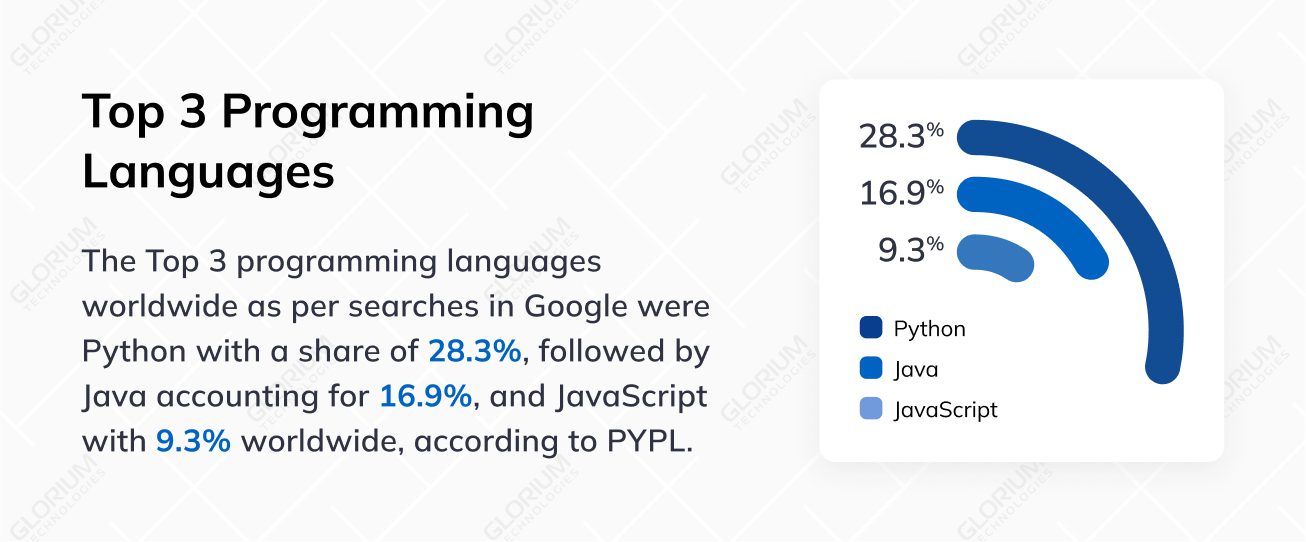
Discuss the tech stack with your IT staff or consult with professional service providers before you hire developers.
Understand your startup needs to choose the best hiring option for your development team and find good developers.
According to Statista, the IT outsourcing market will hit US$541.10bn in 2024. Additionally, many startups opt to outsource their IT services to countries with lower living and labor costs.
| Country | Price Range (per hour) | Outsourcing Pros | Outsourcing Cons | Outsourcing Market |
| India | $19 – $40 | Huge talent pool, cost-effective | variable quality levels, cultural differences | A high number of outsourcing firms and tech exports |
| Ukraine | $25-60 | High English proficiency, highly skilled developers | Time zone difference with the US | Strong focus on technical education and IT community involvement |
| Poland | $13 – $99 | High tech proficiency, good English skills | Time zone difference with the US, higher costs | A high number of specialized tech professionals |
| Philippines | $20 – $60 | Rapidly growing IT sector | Cultural business differences, variable quality levels | Competitive outsourcing destination for software and tech services |
| Romania | $30 – $60 | High tech proficiency, high English proficiency | Cultural and operational misconceptions | Known for IT infrastructure and skilled project management professionals |
| Mexico | $25 – $49 | Proximity to the US, large tech-educated workforce | Bureaucracy | Notable increase in tech hubs and English-speaking tech talent |
| Egypt | $8 – $25 | Cost-effectiveness, strategic location for time zone alignment | Lack of experience in high-level processes | Notable for its rapidly growing tech sector |
You can hire remote developers from professional software development providers rather than seeking freelancers on freelance platforms. They usually have decades of experience, expertise, and case studies for social proof. Time management can be challenging due to different time zones, but it’s manageable.
The pandemic and globalization brought the need for remote developers and freelancers. You can look for freelance developers for your startup if you have a small project.
These professionals usually charge less than full-time or permanent IT specialists do. However, you might come across these issues:
This is a conventional model for large companies, but some startups opt for this option too. Filling out the role of a new candidate requires regulations by national legislation, and it may take up to two months to finalize the search and onboarding.
A full-time developer is a dedicated professional who will need medical insurance, vacation pay, and other necessities. However, it poses stability, a more affluent corporate culture, and a clear hierarchy.
There is a wide array of websites available for hiring developers. Although not all of them offer advanced search functionalities, they do allow you to review prospective hires’ skills and past feedback.
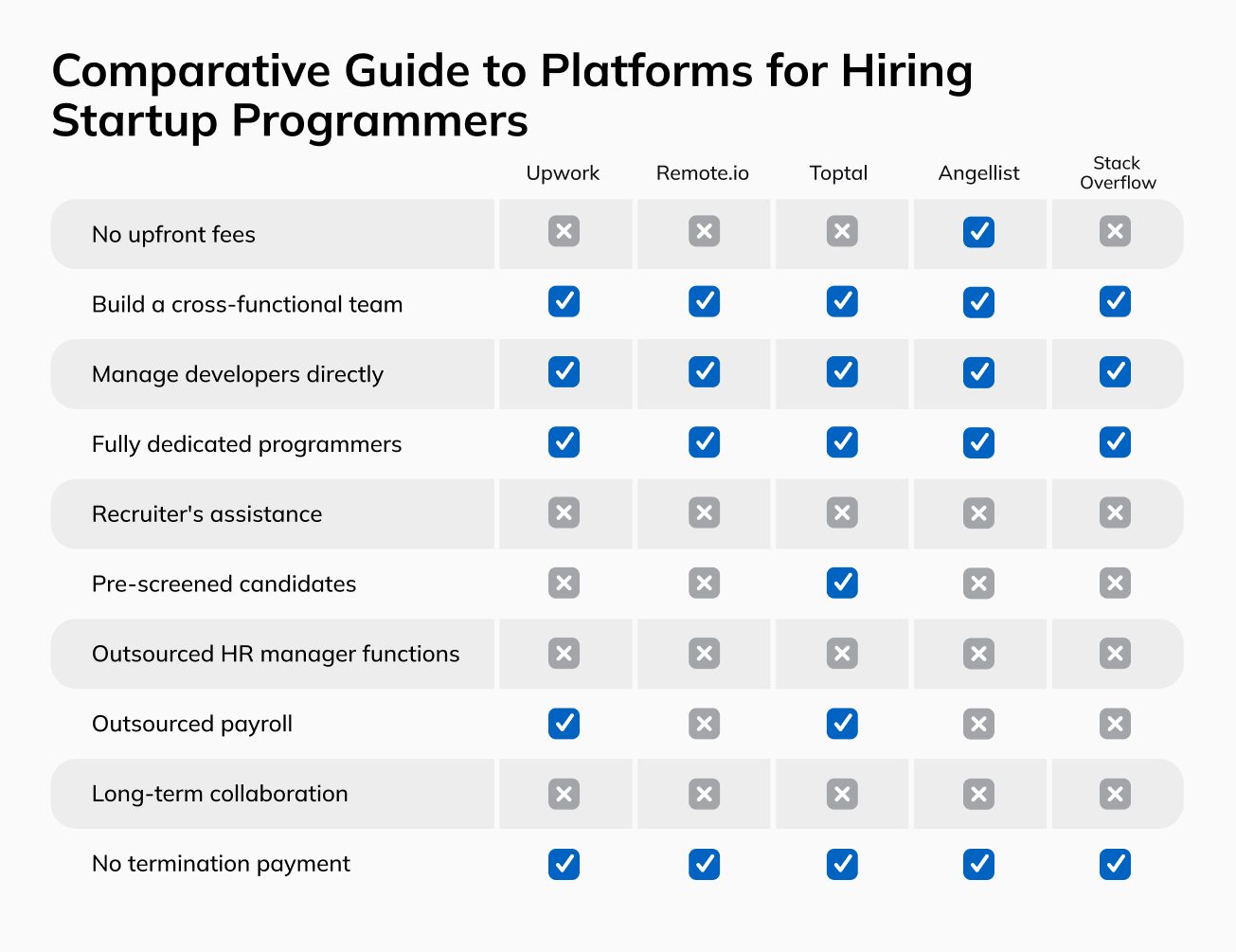
Industry-specific agencies and online platforms help in finding developers with the skills and experience your team needs. Below, you’ll read about some of the most common platforms for hiring good developers.
Upwork is a freelancing platform that connects employers with software developers globally. It offers a diverse talent pool and a system for rating and reviewing freelancers, which can help you find potential hires. You can screen candidates and find suitable ones, but keep in mind that the platform may involve higher fees than direct hiring or outsourcing.
Remote.io provides access to a specialized talent pool, which can broaden the talent search geographically and potentially lower office overhead costs. It’s particularly beneficial for companies looking to tap into global expertise and support flexible work policies. On the downside, there’s a high risk of mismatches between job requirements and employee capabilities.
Toptal connects companies with top-tier professionals. This can be advantageous for specialized projects or temporary expert needs. However, the high caliber of talent comes at a premium cost, potentially straining budgets for startups or cost-conscious businesses. Additionally, focusing on elite professionals may reduce the pool of available candidates, possibly delaying the hiring process.
AngelList caters specifically to startups, offering a niche talent pool familiar with the startup ecosystem and often open to equity-based compensation. This can be a great asset for startups but may not suit larger companies needing a broader candidate range. Additionally, the platform’s focus on startup opportunities means competition for skilled candidates can be fierce, particularly in tech-centric regions.
Stack Overflow is a platform that uniquely combines job listings with a vast community forum populated by developers. This allows companies to tap into a highly engaged and skilled pool of tech talent actively participating in problem-solving and discussions, which can provide insights into the candidates’ expertise and problem-solving abilities. However, because Stack Overflow is primarily a technical forum, its job listing service might not be as robust or focused on recruitment logistics as other dedicated job platforms.
To find an outsourcing company, you can use Clutch.co. Its tools allow checking customer reviews. Another option is looking for representatives of IT companies at specialized conferences. Some less-beaten online search sources are message boards (AngelList, Stack, Mashable, CrunchBoard, TechCrunch, and GitHub).
Dmitriy Stepanov,Co-founder and CTO at Glorium Technologies
Hiring developers in the competitive software market, where large companies grab skilled developers and startups have limited resources that affect their ability to attract top talent, is challenging. Navigating these challenges requires adopting innovative recruitment tactics and enhancing employer branding.
Startups with tight financial constraints sometimes struggle to offer competitive salaries and benefits compared to larger companies when hiring developers. Building a solid company culture and providing equity or profit-sharing options can compensate for limited financial resources and attract developers who value a startup’s entrepreneurial spirit and long-term potential.
Finding a skilled software developer was nearly impossible years ago. Today, the market is saturated with various professionals, but fishing through a large pool is challenging, especially when local talent might not match your requirements. We recommend breaking the geographical limitations and looking for software developers outside your country.
Managing early stage startups means the founder taking on multiple roles. Working as an HR, accountant, and project manager can leave a person burnt out and limit their efforts. Often, startup owners turn to LinkedIn or other job boards to simplify the recruitment process, which might not be beneficial.
You can find a skilled developer for your team on specific platforms and within specialized agencies.
For years, it was considered that good developers chose big tech companies over startups and small businesses. With limited budgets and fewer benefits than large corporations, startups seem like lesser-known brands and less beneficial than big tech companies.
So, how do startups find the right developers for their projects? They interest them in the product, projects, ideas, flexibility, and new technologies. Senior software developers often choose startups over large companies for a more engaging experience, flexibility, and work-life balance.
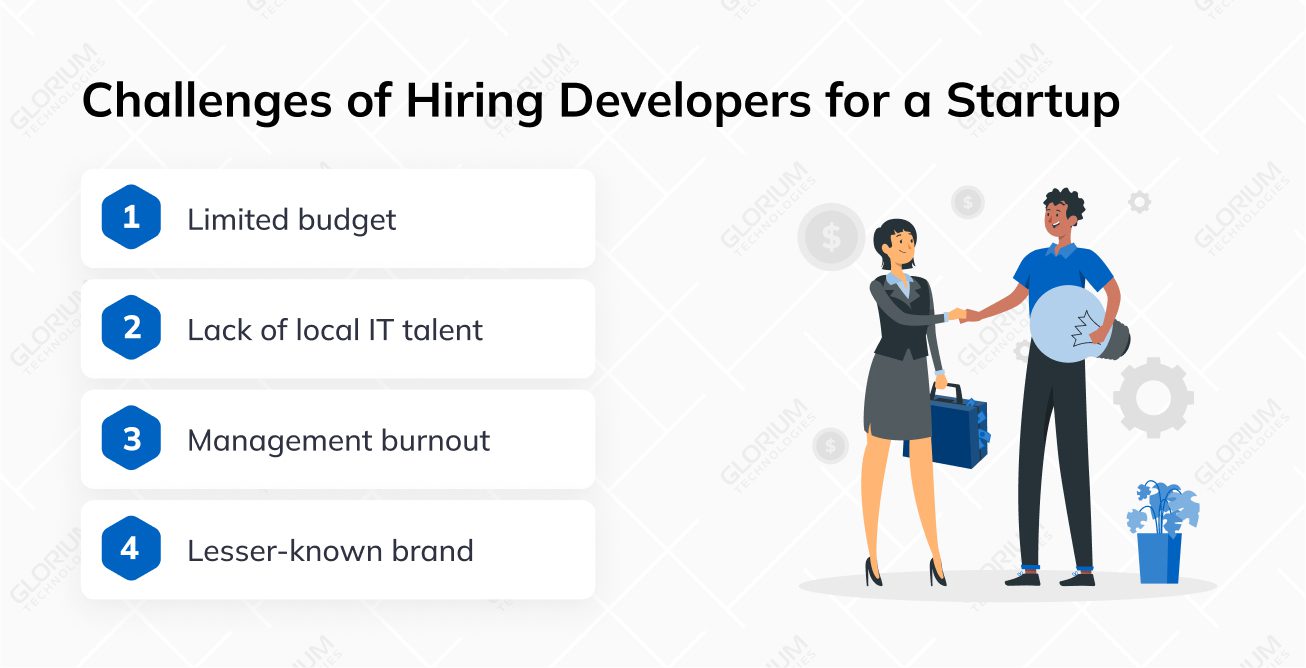
You’ll face competition and challenges if you’re looking for a software developer with limited resources. In this guide, we’ll walk you through 5 essential steps for streamlining the hiring process and finding good developers for your startup.
Describe the hard and soft skills you require from your software development team members to ensure a successful hiring process.
Decide on the following details:
If you are looking for an iOS developer, knowledge of Objective C, Swift (the basics for creating applications), and Xcode IDE are mandatory hard skills.
Android developers must be proficient in Kotlin and Java and have experience using Android Studio, an IDE for Android applications.
IT developers who build cross-platform apps need to know one of the frameworks: React Native, Flutter, Ionic, Xamarin, and NativeScript.
Back-end developers must have experience with Java, .Net, Python, PHP, or Ruby and work with code version control tools.
Finally, front-end developers must be fluent in JavaScript, HTML/CSS and know how to prepare website layouts.
When hiring, create a portrait of your perfect prospective employee. Put in all hard skills, then add the soft skills and anything that would help your new hire to fit into your team and the project. When you have your detailed vision, turn it into an ad for job seekers.
Conversely, you must create an appealing vacancy description to attract candidates. Developers tend to see startups as less reliable employers, so it would be great if you could overcome this stereotype by giving a transparent offer describing the position in detail.
Anna StasishynaHR People Partner, Glorium Technologies
Hiring developers proficient in the required technology stack is essential for every startup owner. To help you decide, explore your candidate’s portfolio, assign a test task, and research feedback from past clients and employers.
If you are not a technical expert, ask the IT professionals to rate the portfolio of a potential teammate. You can also check reviews for a software developer’s work if they have a profile on a platform like Upwork, though not everyone is there. The most effective way to do background checks is to request a reference from two most recent employers. If you can describe your product, explain its value, and expand your business vision, it will be easier to get better candidates to reply.
Anna StasishynaHR People Partner, Glorium Technologies
When hiring software developers, it’s essential to consider their availability and ability to sync with a remote team. Ensure your candidate has time for a new project, is ready to commit to a full-time involvement, and can sync their hours with yours.
After your initial contact with a potential candidate, prepare for the first meeting, a critical juncture where you’ll decide whether to proceed with them or continue your search. To ensure thoroughness, keep a checklist handy to streamline this process, which is particularly useful when evaluating multiple candidates consecutively.
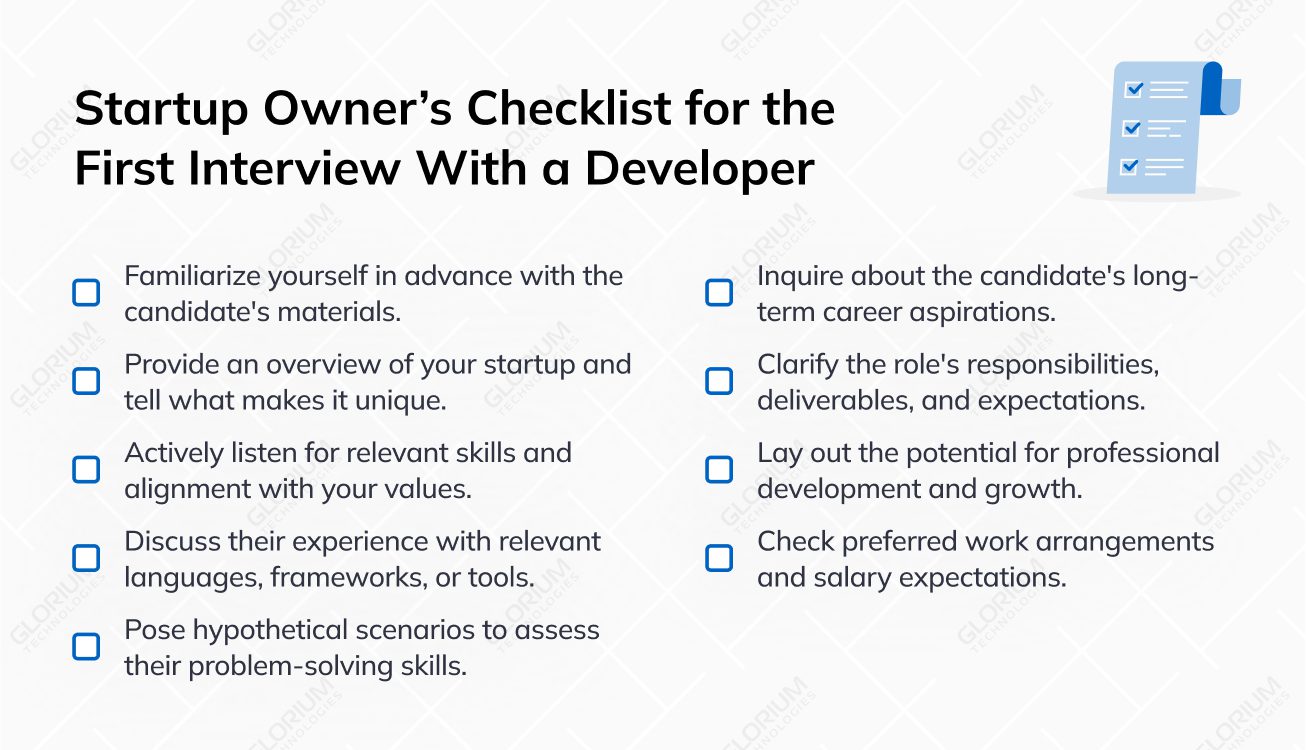
If a candidate makes a positive impression, they will be advanced to the next round of interviews with technical experts and the team lead.
Conducting a technical interview is essential when hiring a developer for a startup. This stage focuses on evaluating the candidate’s hard skills and vision for the project’s future.
Ensure a tech expert from your team leads the interview, which may include coding tasks, system design discussions, algorithmic problem-solving, or a mix of these elements.
During the interview:
By following these guidelines, you can effectively evaluate the technical competence of IT specialists and make informed decisions during the hiring process.
Read also about – software development for startups.
After onboarding your new hire, gradually assign the employee tasks, correcting mistakes at the initial stage. Introduce the programmer to colleagues and assign an experienced technician to supervise the newbie. Define remote communication methods between team members and set fixed working hours.
Virtual work makes it difficult for candidates to understand the corporate culture and internal relationships. However, adopting a positive, inclusive attitude fosters business development. For example, the Korn Ferry study shows a direct connection between highly engaged and capable employees with the growth of company profits.
Glorium Technologies is your go-to partner for finding the best remote developers for your startup or technology company. We understand that hiring the right talent is crucial, so we offer a wide range of services to meet your staffing needs. Whether you need tech pros or non-tech staff, we’ve got you covered.
Our experienced teams consist of skilled professionals who excel in their respective domains, ensuring that your projects are in capable hands. But we don’t stop at staffing alone. We also provide valuable business analytics expertise to help you make the most of your projects. With Glorium Technologies by your side, you can confidently tackle even the most complex projects and drive your company’s success.
Our developers have delivered over a hundred projects for clients in more than 20 countries. Contact us today, and let’s make your ideas a reality together.
Hiring remote developers is an intricate but necessary task for most software startups. You can choose a hiring model according to your requirements, explore job boards, and attract and interview potential candidates.
You have our guide, and you can follow our instructions for the recruitment process. But if you want to avoid going through the hassle of hiring developers yourself, we’re here to help. Contact our team, and we’ll be happy to assist you.
Identify the specific IT professionals required for your project by listing the necessary skills and qualifications. Choose a relevant platform for your search and contact candidates who match the technical requirements. Schedule interviews with the most qualified developers to determine the best fit for your project.
Hiring professional developers is challenging since the market is oversaturated with professionals, but only some have the right skills for your startup.
Startups may additionally struggle with hiring professionals since they’re a lesser-known brand, lack some resources, and can’t offer benefits as large companies can.
You can find developers on job boards and platforms like Upwork, Guru, TopTal, GitHub, LinkedIn, etc. You can also attend meetings and hackathons and search for potential candidates in university job fairs.
Depending on the project scope and your startup requirements, you might need 4-5 professionals to build mobile and web applications. A classic team comprises one project manager, an iOS/Android developer, a back-end developer, and a QA engineer.
Start by defining clear job requirements and crafting compelling job descriptions that highlight your startup’s unique aspects, mission, and exciting projects. Effective communication, prompt responses, and transparency about recruitment stages and timelines are key to engaging with top-tier developers.
The cost of recruiting a developer can vary based on location, experience level, and required skills. Expenses include job advertising costs, recruitment agency fees, salaries and benefits for recruiters, interview and assessment payments, and onboarding and training costs. Budget accordingly and consider the potential return on investment in securing a talented developer for your startup.
It depends on your startup’s needs and budget. Full-time employees provide long-term commitment and consistency, while freelancers/contractors offer flexibility for short-term projects. Many startups start with a mix of both to balance resources.
To retain talent, provide a positive work environment, opportunities for growth, and competitive compensation. Encourage professional development, offer challenging projects, and foster a culture of recognition and appreciation.
Consult with legal experts to ensure compliance with employment laws, non-disclosure agreements (NDAs), intellectual property agreements, and other legal requirements relevant to your region and industry.
Have a structured onboarding process that includes introductions to team members, access to necessary tools and resources, and clear documentation of your startup’s development processes and standards.
Effective communication and project management tools are crucial for managing remote teams. Use collaboration software, conduct regular video meetings, set clear expectations, and establish transparent workflows to ensure success.




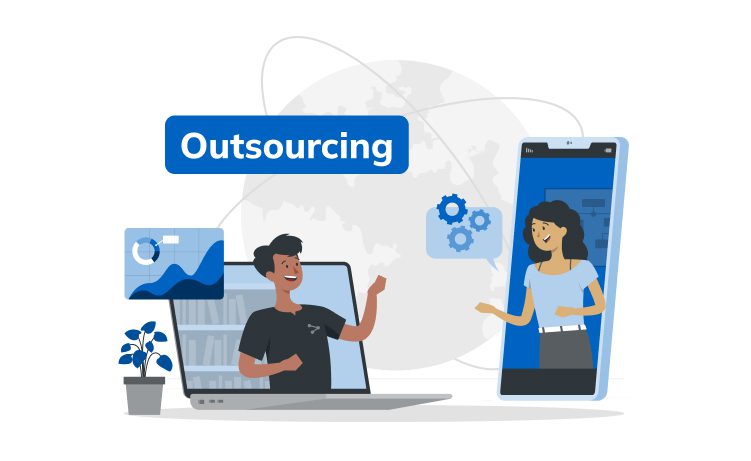




| Cookie | Duration | Description |
|---|---|---|
| cookielawinfo-checkbox-analytics | 11 months | This cookie is set by GDPR Cookie Consent plugin. The cookie is used to store the user consent for the cookies in the category "Analytics". |
| cookielawinfo-checkbox-functional | 11 months | The cookie is set by GDPR cookie consent to record the user consent for the cookies in the category "Functional". |
| cookielawinfo-checkbox-necessary | 11 months | This cookie is set by GDPR Cookie Consent plugin. The cookies is used to store the user consent for the cookies in the category "Necessary". |
| cookielawinfo-checkbox-others | 11 months | This cookie is set by GDPR Cookie Consent plugin. The cookie is used to store the user consent for the cookies in the category "Other. |
| cookielawinfo-checkbox-performance | 11 months | This cookie is set by GDPR Cookie Consent plugin. The cookie is used to store the user consent for the cookies in the category "Performance". |
| viewed_cookie_policy | 11 months | The cookie is set by the GDPR Cookie Consent plugin and is used to store whether or not user has consented to the use of cookies. It does not store any personal data. |